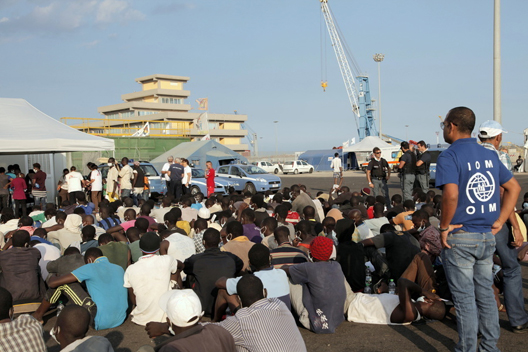 The recent collapse in stock markets and the sudden flow of refugees into Europe led world headlines in August—in a convergence of phenomena that are closely linked. Unprecedented flows of hot, or illicit, money are damaging most economies, causing both investors and migrants to flee.
The recent collapse in stock markets and the sudden flow of refugees into Europe led world headlines in August—in a convergence of phenomena that are closely linked. Unprecedented flows of hot, or illicit, money are damaging most economies, causing both investors and migrants to flee.
Ironically, China has outperformed all other economies, even though it has been looted more than most. Between 2003 and 2012, an estimated $1.25 trillion fled the country, bypassing currency controls. China’s most recent attempt to turn off the tap contributed to the collapse of the Shanghai Composite Index.
Many commentators blamed the Shanghai’s 8.5 percent rapid drop on Beijing’s orchestrated devaluation of the yuan. But the devaluation had occurred two weeks earlier without any impact.
On August 23, the day before the crash, the Chinese government announced a tough three-month crackdown on underground banking in order to curb money laundering and illegal funds transfers. That followed reports that an estimated $100 billion left China in the first three weeks of August alone. Chinese law prohibits individuals from transferring more than $50,000 out of the country per year, but an underground industry of banks, casinos, and intermediaries continues to flourish.
China was forced to bail out its markets through monetary and bank tampering. This has improved markets somewhat, but the volatility will continue. Worries persist because, during the melee, state-owned newspapers published an anonymous article warning that the reform process faces “unimaginably fierce resistance.”
This has led to speculation that the reformist regime is wobbly—sparking the disappearance of even more capital from the Chinese economy.
China’s wealthiest have been getting themselves, their children, and their money out of the country for years—mostly to the US, Canada, Australia, or Britain—continuing the influx of well-heeled Chinese citizens into the world’s richest markets. Those same trends—outflows and emigration—are also underway in poorer nations, with tragic consequences. As their economies tank, the European Union bears the brunt of a growing refugee problem.
According to a study by Washington-based Global Financial Integrity, more money leaves the world’s 82 poorest nations illicitly—an estimated $1 trillion per year—than flows in as foreign aid or direct investment. The worst-hit regions also happen to be the three largest sources of refugees fleeing to the EU. Between 2003 and 2012, sub-Saharan Africa, the Middle East and Eastern Europe were drained of $2.5 trillion in capital—and substantially more since then. These figures include illegal practices such as fraudulent invoicing and illicit investments abroad, as well as hot money outflows.
In dollar terms, this is equivalent to what Russia, Mexico, and India have lost—but much higher as a percentage of their populations, GDP, and educational budgets. In poor nations, such hemorrhages are destabilizing, but the money also creates dislocations in rich markets like Toronto, Vancouver and New York, where these investors salt away billions of dollars in luxury condos—making prices unaffordable for locals.
Other developing countries contribute to this tragedy. Between 2003 and 2012, Russia lost $1 trillion, Mexico $500 billion and India $439 billion.
The outflow of money and migrants won’t stop anytime soon. A 2013 United Nations survey showed that roughly 230 million people live outside their home countries by choice, and that another 640 million would leave if they could. This affects politics in all countries involved, but especially in the US and Europe, where the debate on illegal immigration has taken center stage.
The United States is home to about 11.5 million undocumented immigrants, By comparison, this year alone Germany was inundated with 800,000 non-EU refugees, four times more than previous years. Germany is the principal destination for many refugees because of its economic prosperity.
Sadly, announcements like China’s—that a crackdown on illegal outflows is imminent—only triggers more of the same. Similarly as word spreads that European countries are building fences, more refugees arrive. The motivation is to get out while it’s still possible. This is understandable, yet long-term solutions remain elusive.
Toronto-based writer and economic analyst Diane Francis is a Senior Fellow with the Atlantic Council.
Image: Migrants rescued in March 2015 by the Italian Coast Guard wait for assistance in Sicily. Credit: Francesco Malavolta / International Organization for Migration
